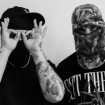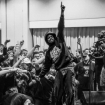From Run-DMC and Aerosmith, to Public Enemy and Anthrax, to Rage Against the Machine, to the Judgment Night soundtrack and a little thing called nu-metal — hip-hop and hard rock have a long history of collaboration and cross-pollination. That mutual respect continues today, as rap duo Run the Jewels testify to in our premiere episode of "Secret Metalheads," in which artists and other notable figures outside of the metal world reveal their love for the music and scene.
In that spirit, we asked you, our fans and followers, to pick the hardest hip-hop albums of all time, and the opinions came in fast and furious across social media. Find the ranked results below.
5. Public Enemy - Fear of a Black Planet
Fear of a Black Planet is the Bomb Squad's greatest achievement, and by default the pinnacle of that style of rap beat. The production team's cut-and-paste approach to beats (way back before sampling was a legal issue) often produced a towering musical Frankenstein Monster that provided a discordant, aggressive and confrontational instrumental backdrop for MCs.
Add in a furious version of the most serious and politically aware rappers of all time (Chuck D), as well as the yin to his yang (Flavor Flav), and you have unquestionably one of the hardest hip-hop records ever laid to wax.
4. Body Count - Cop Killer
Less than a year after setting a new standard for gangsta rap on 1991's revered O.G. Original Gangster LP, Ice-T made a sudden pivot to the mosh pit with Body Count, his no-holds-barred metal band.
Between its controversial lyrics, thrashy grooves and raucous arrangements, 1992's eponymous album isn't really a hip-hop album, but it was easily the most aggressive rapper-fronted record circulating around the mainstream at the time. Its greatest legacy, of course, remains the controversial, eye-opening and sadly still very relevant title track.
3. Geto Boys - We Can't Be Stopped
Geto Boys' We Can't Be Stopped helped make Nineties gangsta rap even darker and stranger than it already was.
Each member of the group came with his own take on what violence brings out in people, their combined dynamic tackling complex issues in surprising ways. "Minds Playing Tricks on Me" (evolved from an original Scarface track) features raw verses about paranoia and PTSD contrasted by a jazzy backing track. "Fuck a War" starts as a criticism of the military before the group switches gear, saying they'd rather push the button and get the apocalypse over with than deal with lying politicians.
It's rare to find lyricism as genuinely hard-hitting and sometimes even nihilistic as what Geto Boys put together on this milestone LP.
2. Wu-Tang Clan - Enter the Wu-Tang (36 Chambers)
Everything about 36 Chambers is punk.
From the lack of a chorus on the first single "Protect Ya Neck," to the way it was initially sold (literally out of the trunk of the group's car on Wu-Tang Records), to the confusing concept, to the abandonment of previous endeavors to create the collective (see the bios of Prince Rakeem and The Genius), 36 Chambers rewrote all the rules, dazzled with its incredible wordsmith-ing and kept heads on swivel with it's hard-as-nails beats. Look no further than the opening track, "Bring Da Ruckus," and good luck naming a heavier drum loop.
1. N.W.A. - Straight Outta Compton
Widely regarded as the alpha and omega of gangsta-rap albums, N.W.A.'s 1988 masterpiece Straight Outta Compton saw the SoCal crew channeling its experiences with the racism and abusive power structures plaguing 1980s Los Angeles into one of the most incendiary, essential LPs ever recorded.
As with their East-Coast contemporaries Public Enemy, Dr. Dre, Ice Cube, Eazy-E and Co. were effectively the rap equivalent of a punk group, challenging — and redefining — the status quo on clobbering tracks like "Straight Outta Compton" and "Fuck the Police." The feds were right to fear N.W.A., at least from a musical standpoint; few albums present a more powerful and legitimate opposition to authority.












